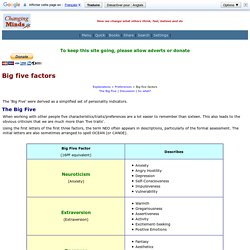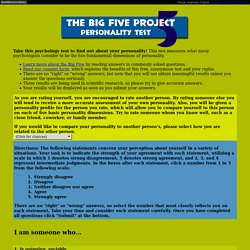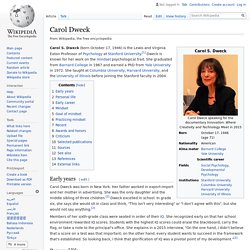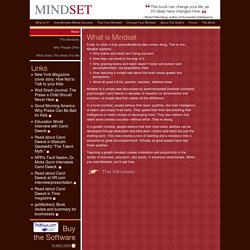

Personality Psychology. Conscientiousness. Agreeableness. Openness. Extroversion. Need for Stability. The Big Five Personality Traits & Workplace Behavior. Work Place Big Five Personality Assessment - CENTACS. [raw] This is The WorkPlace Big Five Personality Profile 4.0 Assessment product overview and information page.

To go directly to the catalog page for each product, please click here. If you have any questions, please feel free to phone us at 716-836-8683. Our email is info@LeadershipDirection.com WorkPlace Big Five Personality Profile 4.0 – Online Assessment. The Big Five Personality Model. The Big Five Personality Model. Big Five factors. Explanations > Preferences > Big five factors The Big Five | Discussion | So what?

The 'Big Five' were derived as a simplified set of personality indicators. The Big Five Project - Personality Test. Directions: The following statements concern your perception about yourself in a variety of situations.

Your task is to indicate the strength of your agreement with each statement, utilizing a scale in which 1 denotes strong disagreement, 5 denotes strong agreement, and 2, 3, and 4 represent intermediate judgments. In the boxes after each statement, click a number from 1 to 5 from the following scale: Strongly disagreeDisagreeNeither disagree nor agreeAgreeStrongly agree. Big Five personality traits. In psychology, the Big Five personality traits are five broad domains or dimensions of personality that are used to describe human personality.

The theory based on the Big Five factors is called the five-factor model (FFM).[1] The five factors are openness, conscientiousness, extraversion, agreeableness, and neuroticism. Acronyms commonly used to refer to the five traits collectively are OCEAN, NEOAC, or CANOE. Five Factor Model of Personality. Big Five personality traits. Skills You Need - Helping You Develop Life Skills.
Science & Nature - Human Body and Mind - Mind - Personality. Education Week. Opinion By Carol Dweck For many years, I secretly worked on my research. I say “secretly” because, once upon a time, researchers simply published their research in professional journals—and there it stayed. However, my colleagues and I learned things we thought people needed to know. Carol Dweck - Wikipedia. Carol S.

Dweck (born October 17, 1946) is the Lewis and Virginia Eaton Professor of Psychology at Stanford University.[1] Dweck is known for her work on the mindset psychological trait. She graduated from Barnard College in 1967 and earned a PhD from Yale University in 1972. She taught at Columbia University, Harvard University, and the University of Illinois before joining the Stanford faculty in 2004.
What is Mindset. Every so often a truly groundbreaking idea comes along.

This is one. Mindset explains: Why brains and talent don’t bring success How they can stand in the way of it Why praising brains and talent doesn’t foster self-esteem and accomplishment, but jeopardizes them How teaching a simple idea about the brain raises grades and productivity What all great CEOs, parents, teachers, athletes know. DiSC & MBTI.